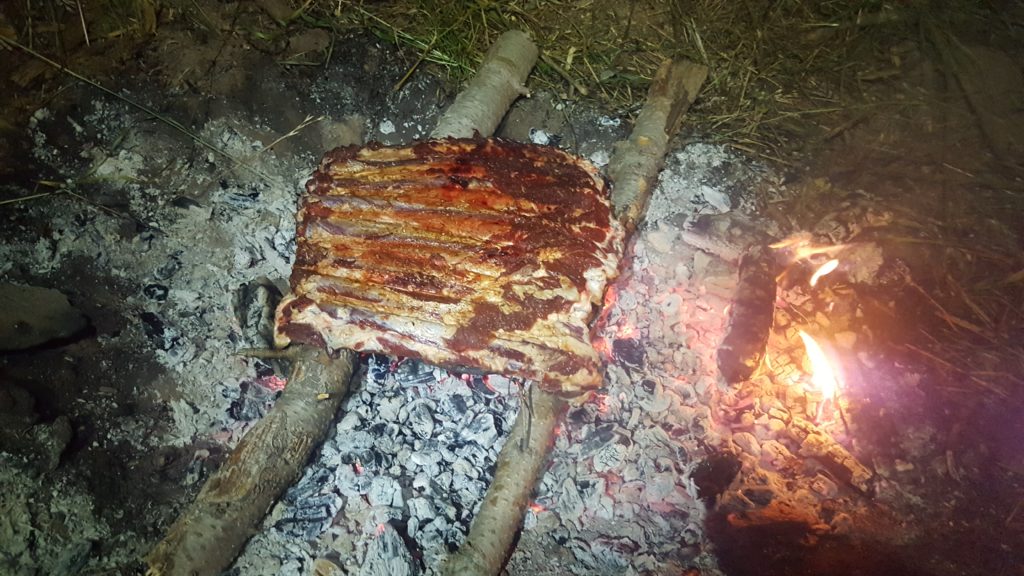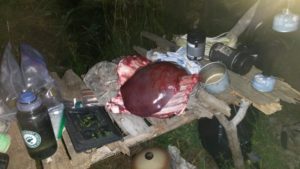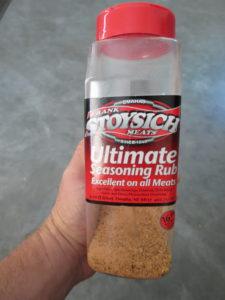Here’s one I thought I’d share while it’s still fresh on my mind. For the first time ever we cut out the ribs (bone-in) and cooked them over the coals on our backcountry elk hunt. Freaking amazing!

I cannot really explain why we had never tried this before, probably because everybody says they’re either no good, or there’s so little meat it’s not worth the effort. This is why I hate going along with the masses and not trying something myself. And, I do have to give the MeatEater Crew credit for this because I watched them cook Dall sheep ribs on a recent show and thought I should give it a try, so I can claim no originality.
On the way up to our hunt, I warned all the guys that I had some new menu items I wanted to try. Specifically, ribs, bone marrow (bones cooked over the coals) and a few others I won’t even mention so I don’t disturb the reader. So after all my big talk I’m embarrassed to admit that once my elk hit the ground and I was skinning and quartering him solo by the light of my headlamp, I thought, no way am I messing with these stupid ribs. By this time, it was getting late and I was tired, I could just hear all those negative voices I’d heard over the years playing in the back of my head, nobody takes the ribs... I should mention, we do typically take the meat from the ribs just not the whole rib cage. So as I was finishing up the quartering process, starting to relax a little knowing the bulk of the work was behind me, I realized I wanted to grab the heart and liver and since I usually do the gutless-method of breaking down an elk I’d either have to “gut” the carcass or (ah-ha) remove the rib cage.
I reluctantly pulled out the little saw blade on my Leatherman and to my surprise realized that little bugger chewed right through the rib bones with almost zero effort. In a matter of minutes I was holding the entire slab in my hands.
Since both Drew and myself had already tagged out we decided the next day we’d cook some fresh meat for dinner, and with the whole day at our disposal we had time to do it right. We had a nice fire going for several hours before we expected the others back that evening, so plenty of time for a great bed of coals. I also took the ribs down to the creek and cleaned them up nicely, mainly removing all the excess fat. This is another area I was unsure of since it’s commonly said that the “gameyness“ of wild meat comes primarily from the fat. So, while I removed the bigger chunks from the outside of the slab, there was still a fair amount of fat between the bones alongside the meat. Honestly at this point I was still thinking this was more of a big science experiment and figuring we’d probably need a backup dinner plan… Anyway, we kept plugging away and I did have the foresight to bring a little baggie of our favorite seasoning, Stoysich – Ultimate Seasoning Rub, from a little butcher shop in Omaha Nebraska. With a liberal coating of seasoning on each side and about 10-min per side over the coals the experiment was ready to be tested!
Like I said, I still had no idea how these bad boys were going to taste, but they were Lights Out – fantastic!
Now I do have a couple disclaimers; before trying this at home (or more accurately) in the field, we were on about day four or five into our dehydrated Mountain House dinners, so that definitely could have skewed our perspective. We all also know wild game doesn’t have near the fat content of domestic beef or hogs, so the meat didn’t exactly fall off the bone. In fact, you had to pretty much gnaw it off caveman style, which was maybe more appealing considering we were eating around our mountainside crafted dinner table (thanks Preacher!).

And we were told after-the-fact that the fat in the ribs will start to sour in a couple days which is why they typically aren’t saved. I haven’t confirmed this but it’s worth investigating. I will say with confidence it was the best thing I’d ever eaten as far as outdoor dining goes and realistically I couldn’t think of a better meal that I’d ever eaten in a 5-star restaurant (they just can’t match the ambiance ). We followed up the ribs with a hunting camp classic, fresh tenderloin, and I’ve got to say I think I liked the ribs better.
So this Fall if you’re lucky enough to punch your tag, try something a little outside the box. I can promise you I’ll personally never leave the ribs behind again (assuming I have an effective way to transport them in the field).
Good luck and shoot straight!


Uncle Len
Wow, great story and those do sound delicious. Nothing like knawing off the meat of a bone especially cooked over a fire yum. thanks for sharing. I will let Aunt Robin know you mentioned stoysich
Jake Frankhouser
Congrats to you and Drew. I need to hear more about the trip.. A story in the offing? BTW the ribs look good. Did you eat the liver too?
Matt
There may be a story coming on this one…
Some of the fresh liver went to the horse packers but by the time I tried cooking some at home it had started to go bad. It wasn’t until the entire “liver & onions” were done that I realized something just wasn’t right. We did eat the heart in camp the following night and it was fantastic. The best I’d ever done on heart (cooking wise). Normally, you just eat it out of tradition and its so-so taste wise, always a bit rubbery, but it seems great because it’s the celebratory meal. But this year was great, I cut off the top where all the plumbing connects and butterflied in open and rubbed it down (like the ribs) and seared in on the fire. We had a couple onions and jalapenos simmering in another pot with a ½ can of PBR (forgot any butter or oil). Sliced up the heart and threw it into the stew mix and it was excellent! Glad I finally found a better way of cooking that thing. Love that it doesn’t go to waste but hate to have to choke it down…